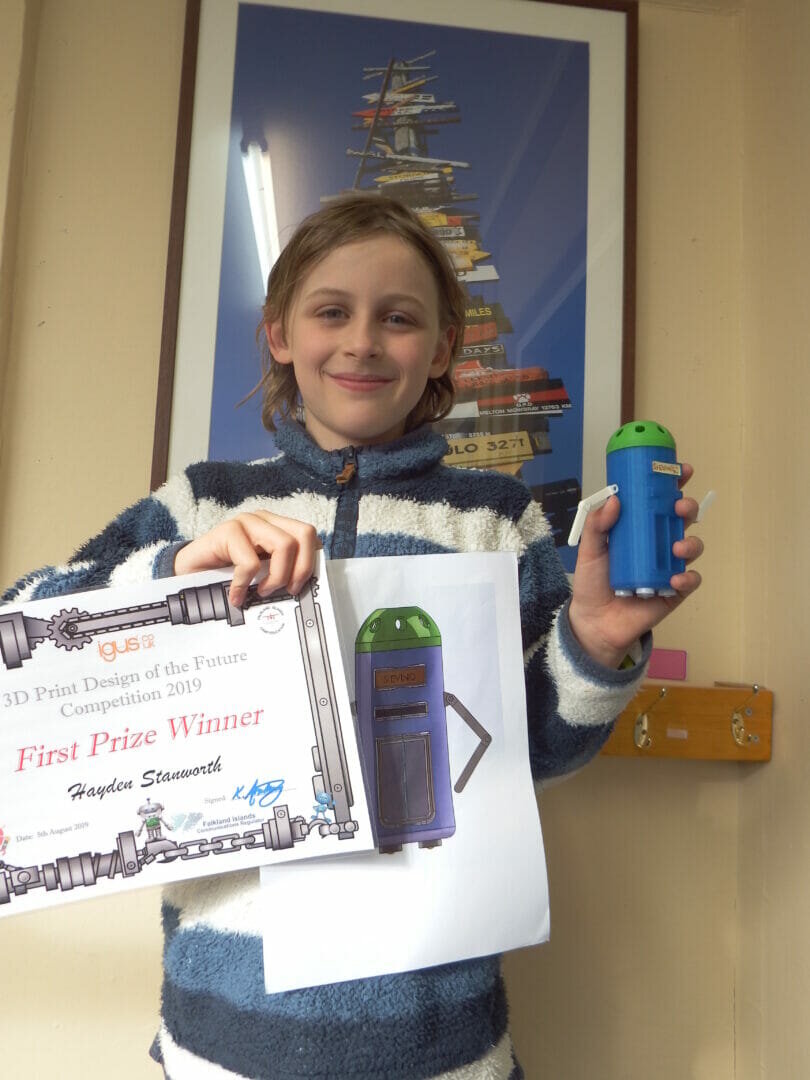The Falkland Islands are an archipelago comprising two main islands and 778 smaller islands covering an area of 12,000 sq km (almost half the size of Wales) with a population of just over 3.5 thousand. Here, a radio station covers local news and the territory’s only newspaper is Penguin News. The islands are self-governing: Susannah Nightingale, Communications Regulator is appointed by the Governor of the Falkland Islands. There are two schools in Stanley, the capital, the Infant and Junior School and Camp Education (IJS&CE) teaches ages 4 to 11 and the Falkland Islands Community School caters for ages 11 to 16.
During Communications Week, a programme arranged by the Communications Regulator, concerns were raised, particularly by parents, that children were not using technology in a way that their peers may be elsewhere in the world. They decided that steps should be taken to empower their children to give them confidence to pursue studies and careers in technology – expertise much needed for the future.
“There are vast possibilities that Information and Communication Technologies (ICTs) offer,” says Susannah Nightingale, Communications Regulator. “More needs to be done to quell misconceptions about the sector and invite children to imagine a future as more than an ICT user, but also a creator.”
Karen Armstrong, Computing Teacher at IJS&CE, agrees: “Our young people need to aspire to use advanced technologies and what better way to do that but to see the process through from design to the final product, with the help of leading experts.”
Experienced in involving young people in technology, they decided to set up a competition, with the Junior children, to create a design and see it come to life through 3D printing. They partnered with igus UK to bring a taste of 3D printing to the school. Based in Northampton in the UK, igus has global headquarters in Cologne, Germany.
Robert Dumayne, dry-tech director at igus, explains how 3D printing is relevant to children in the Falkland Islands: “3D printing has come a long way since it was first introduced almost 30 years ago. The technology has moved away from the scientific world and basic 3D objects to creating intricate designs for the fashion, automotive, medical and industrial automation sectors.”
The challenge was to simply take a piece of A4 paper, pick up a pen and draw a design for one of two themes. The first was a recycling robot or litter picker that could be used in the Falklands to keep streets or oceans clean. The second was to imagine what transport would be like in the future for the islanders. The winning design was sent to igus and converted into a digital design then 3D printed.
All three – Nightingale, Armstrong and Dumayne – were involved on the judging panel, who looked at over 40 entries. The overall winner was Hayden Stanworth with his innovative ‘Sieving’ robot, which separates out recyclable waste. Coming highly commended with a Teacher’s Certificate of Excellence was Toyah Wilson with her picker robotic arm.
“With more people understanding the potential of 3D printing, the technology is set to revolutionise life in the Falkland Islands,” concludes Nightingale. “Perhaps in the not too distant future, items will no longer be manufactured in factories and shipped thousands of miles to the buyer, instead a file of the 3D product is simply downloaded and printed at home.”
For more information, please visit: www.igus.co.uk or call igus directly on: 01604 677240
igus resources:
| LiveChat with our technical team at igus.co.uk | |
| Follow us at twitter.com/igusUK | |
| Watch our videos at igus.co.uk/YouTube | |
| Connect to us at igus.co.uk/Facebook | |
| Read our blog at blog.igus.co.uk |
About igus:
Based in Northampton in the UK and with global headquarters in Cologne, Germany, igus is a leading international manufacturer of energy chain systems and polymer plain bearings. The family-run company is represented in 35 countries and employs 4,150 people around the world. In 2018, igus generated a turnover of 748 million euros with motion plastics, plastic components for moving applications.
With plastic bearing experience since 1964, cable carrier experience since 1971 and continuous-flex cable experience since 1989, igus provides the right solution based on 100,000 products available from stock, with between 1,500 and 2,500 new product introductions each year. igus operates the largest test laboratories and factories in its sector to offer customers quick turnaround times on innovative products and solutions tailored to their needs.
The terms igus, Apiro, chainflex, CFRIP, conprotect, CTD, drylin, dry-tech, dryspin, easy chain, e-chain, e-chain systems, e-ketten, e-kettensysteme, e-skin, flizz, ibow, igear, iglidur, igubal, kineKIT, manus, motion plastics, pikchain, plastics for longer life, readychain, readycable, ReBeL, speedigus, triflex, robolink, and xiros are protected by trademark laws in the Federal Republic of Germany and internationally, where applicable.
All other registered trademarks and trademarks are the property of their respective owners.
For further information, please contact:
Megan Campbell, igus
Tel: 01604 677240
Email: [email protected]
Dulcie Elliot, Publitek
Tel: 01582 390980
Email: [email protected]





